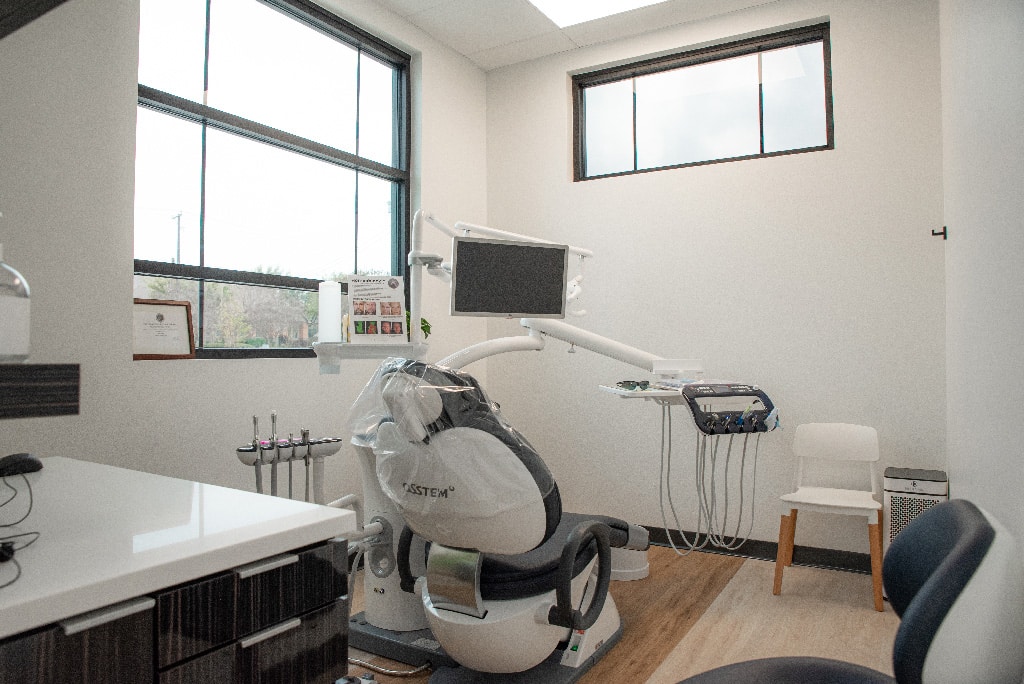
When you experience that sharp pain while biting into your favorite food or that sudden sensitivity to hot or cold beverages, you might be dealing with a cracked tooth. At Central Park Dental, Dr. Jung and our experienced team regularly help patients navigate this common but concerning dental issue. Today, we’ll explore everything you need to know about cracked teeth, from identifying the problem to understanding your treatment options.
What Exactly Is a Cracked Tooth?
A cracked tooth, while seemingly straightforward, can be surprisingly complex. Think of your tooth as a piece of fine china – it’s strong but not indestructible. When stress exceeds the tooth’s natural resistance, cracks can develop. These cracks can range from tiny, superficial lines to deep fractures affecting the tooth’s core structure.
Dr. Jung explains that cracked teeth often present differently from patient to patient, making them one of dentistry’s more challenging diagnostic puzzles. “What makes cracked teeth particularly tricky,” says Dr. Jung, “is that symptoms can come and go, leading many patients to delay seeking treatment until the condition worsens.”
Common Causes of Cracked Teeth
Understanding what causes teeth to crack can help you prevent future dental emergencies. Here are the most frequent culprits we see at Central Park Dental:
Age-Related Wear: As we age, our teeth naturally become more susceptible to cracks. Years of chewing, grinding, and temperature fluctuations can gradually weaken tooth structure.
Teeth Grinding (Bruxism): This unconscious habit, particularly common during sleep or stressful situations, places excessive force on teeth. Dr. Jung notes that many patients don’t realize they grind their teeth until dental complications arise.
Poor Bite Alignment: When teeth don’t meet correctly, certain areas bear more pressure than others, potentially leading to cracks over time.
Traumatic Injury: Direct impacts from sports accidents, falls, or other trauma can immediately crack teeth.
Large Fillings: Teeth with substantial fillings may have weakened structures, making them more prone to cracking.
Recognizing the Signs
Early detection of a cracked tooth can make the difference between saving and losing the tooth. Watch for these warning signals:
Pain when biting or chewing, especially when you release the bite Sensitivity to hot, cold, or sweet substances Intermittent pain that seems to come and go Swollen gums around a specific tooth Difficulty pinpointing which tooth hurts
Dr. Jung emphasizes that not all cracks are visible to the naked eye. “Many patients come in confused because they can’t see anything wrong, yet they’re experiencing significant discomfort. This is where our advanced diagnostic tools at Central Park Dental become invaluable.”
Types of Tooth Cracks
Understanding the different types of cracks helps determine the most appropriate treatment approach:
Craze Lines: These superficial cracks affect only the outer enamel. While they might be cosmetically concerning, they typically don’t require treatment unless they affect appearance.
Fractured Cusps: These cracks usually occur around dental fillings and affect the pointed chewing surfaces. They rarely damage the pulp but may require crown placement.
Vertical Root Fractures: Starting at the root and extending upward, these serious cracks often require extraction. Early detection through regular dental check-ups is crucial for preventing these severe cases.
Split Tooth: A crack that travels through both cusps and splits the tooth into distinct segments. This typically results from an untreated cracked tooth and requires complex treatment or extraction.
Advanced Diagnostic Techniques at Central Park Dental
At Central Park Dental, Dr. Jung employs state-of-the-art diagnostic tools to identify and assess tooth cracks:
Digital X-rays: Providing detailed images with minimal radiation exposure Transillumination: Using special light to illuminate cracks Bite test materials: Helping identify precise pain locations 3D imaging: When necessary for complex cases
Treatment Options: A Personalized Approach
Dr. Jung believes in tailoring treatment plans to each patient’s specific situation. Treatment options may include:
Bonding
For minor cracks, composite resin bonding can effectively seal the crack and restore the tooth’s appearance. This conservative treatment often provides immediate relief and protection.
Dental Crowns
When cracks are more substantial, a crown might be necessary. Dr. Jung uses premium materials that combine durability with natural aesthetics. “Modern crowns are incredibly lifelike,” Dr. Jung explains. “Most patients can’t tell the difference between their crowned tooth and their natural teeth.”
Root Canal Therapy
If a crack extends into the pulp, root canal treatment may be necessary before crown placement. Our gentle approach and modern techniques make this procedure much more comfortable than its reputation suggests.
Extraction and Replacement
In severe cases where the tooth cannot be saved, Dr. Jung offers several replacement options, including dental implants, bridges, or partial dentures.
Prevention: Your Best Defense
Preventing cracked teeth is always preferable to treating them. Dr. Jung recommends:
Regular dental check-ups to catch potential issues early Wearing a custom night guard if you grind your teeth Avoiding chewing on ice, hard candy, or non-food items Using appropriate protective gear during sports Addressing bite issues promptly
The Cost Factor: Making Treatment Accessible
At Central Park Dental, we understand that cost concerns might delay necessary treatment. That’s why we offer:
Flexible payment plans Multiple insurance options Transparent pricing Financial consultation services
When to Seek Emergency Care
Some situations require immediate attention. Contact our office immediately if you experience:
Severe pain that interferes with daily activities A clearly visible crack with persistent sensitivity Pain that wakes you up at night Signs of infection (swelling, fever, tender lymph nodes)
Why Choose Central Park Dental for Your Cracked Tooth?
Dr. Jung’s extensive experience with cracked teeth, combined with our state-of-the-art facility, ensures you receive the highest quality care. Our team’s commitment to patient comfort and education means you’ll understand every aspect of your treatment plan.
Schedule Your Consultation Today
Don’t let a cracked tooth compromise your oral health or quality of life. Call Central Park Dental at 817-466-1200 to schedule your consultation with Dr. Jung. Our friendly staff will help you find an appointment time that works with your schedule.
You can also conveniently schedule your appointment through our website. Remember, early intervention often leads to simpler, more conservative treatment options.
Quick Response Time
We understand that dental emergencies don’t always happen during business hours. That’s why we offer:
Same-day emergency appointments when possible Clear communication about treatment options Prompt pain management solutions Extended hours for urgent cases
Your Partner in Dental Health
At Central Park Dental, we’re more than just your dental care provider – we’re your partner in maintaining optimal oral health. Dr. Jung and our team are committed to providing the education, treatment, and support you need to keep your smile healthy and beautiful for years to come.
Remember, a cracked tooth won’t heal on its own, and delaying treatment often leads to more complex and costly procedures down the line. Take the first step toward relief and protection by contacting Central Park Dental today at 817-466-1200 or scheduling a consultation with Dr. Jung at Central Park Dental today.
Whether you’re experiencing symptoms of a cracked tooth or simply due for a check-up, we’re here to help. Let Dr. Jung and the Central Park Dental team provide you with the exceptional care you deserve.


